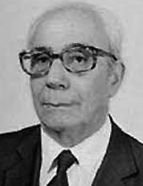

Pina Martins’ relationship with the Lisbon Academy of Sciences grew closer in 1978, when he was elected associate member, but it was from 1983 onwards – the year in which he was also elected member of merit of the Portuguese Academy of History – that his work at that institution became particularly significant. Indeed, after being elected corresponding member in 1985, Pina Martins took up the position of Inspector of the Library of that institution in 1986. In this capacity, he coordinated the production of descriptive catalogues of the old collection (old Portuguese, Spanish and Italian books), added the collection of incunabula to this important bibliographic collection and made efforts to provide the Academy’s library with a work room that would allow it to be opened to the public. In 1991, he was simultaneously elected President of the Literature Class and Vice-President of the Academy. José V. de Pina Martins played an important role in the modernisation, internationalisation and opening up of the Academy of Sciences to civil society, developing intense activity as an academic. Between 1989 and 1996, he was elected a member of prestigious foreign academies and scientific societies (Rome, London, Madrid, Salzburg, Rio de Janeiro, Venezuela and Moscow). During this period, he was also awarded two honorary doctorates: by the University of Lisbon (1991) and by the Moscow Academy of Sciences (1996). In addition to these distinctions, Pina Martins received several decorations (Portuguese, Italian, French and Brazilian) and awards (Pen Club essay award in 2008 and Pedro Hispano award in 2010) throughout his life. He died in Lisbon in 2010.
Work and main lines of historical thought: It was in 1941, at the age of 21, that José V. de Pina Martins published his first book in Coimbra: a collection of “ascetic-philosophical poems” entitled Pregunta de Pilatos (Pilate’s Question) and signed with the pseudonym Duarte de Montalegre. This publication marked the beginning of his involvement with the intellectual circles that animated the various poetry journals then in vogue in Coimbra. In fact, in 1943, he became editor-in-chief of Estudos. Revista de Cultura e Formação Católica, published by the ‘Centro Académico Democracia Cristã’, signing a “Manifesto da Poesia Nova” (Manifesto of New Poetry) which set out the principles of the movement of the same name in which he participated, alongside José V. de Pina Martins, Miguel Trigueiros and Eurico Colares Vieira. Among other scattered literary collaborations, there is a collection of poems published in Altura. Cadernos de Poesia (Poetry Notebooks ) – where José Régio and Pedro Homem de Melo, among others, also published during the same years – and also the dissemination of scattered poems in Alma Nova in 1945, and the publication of essays in Via Latina, always under the name Duarte de Montalegre. Between 1941 and 1963, Pina Martins published around 70 titles under this nom de plume. During this period, although he produced some critical studies on the history of books (such as Elogio della Bibliofilia in 1956, Note su Libri Cinegetici Italiani e Francesi dei Secoli XV e XVI in 1958, and A Biblioteca Universitária de Urbino e os seus Incunábulos in 1959) and on topics related to literature and culture (such as Ensaio sobre o Parnasianismo Brasileiro in 1945, Reflexões críticas sobre Eça de Queirós in 1947, Literary Criticism in Portugal from 1949, The Constitutional Portuguese and the Revolution of September 1836 from 1959, for example), his interests seem to have been oriented mainly towards philosophical and aesthetic inquiry, in a search for meaning anchored in a very critical view of materialism, which was intended to be renewing within Catholicism.
This work is financed by national funds through FCT - Foundation for Science and Technology, I.P, in the scope of the projects UIDB/04311/2020 and UIDP/04311/2020.
